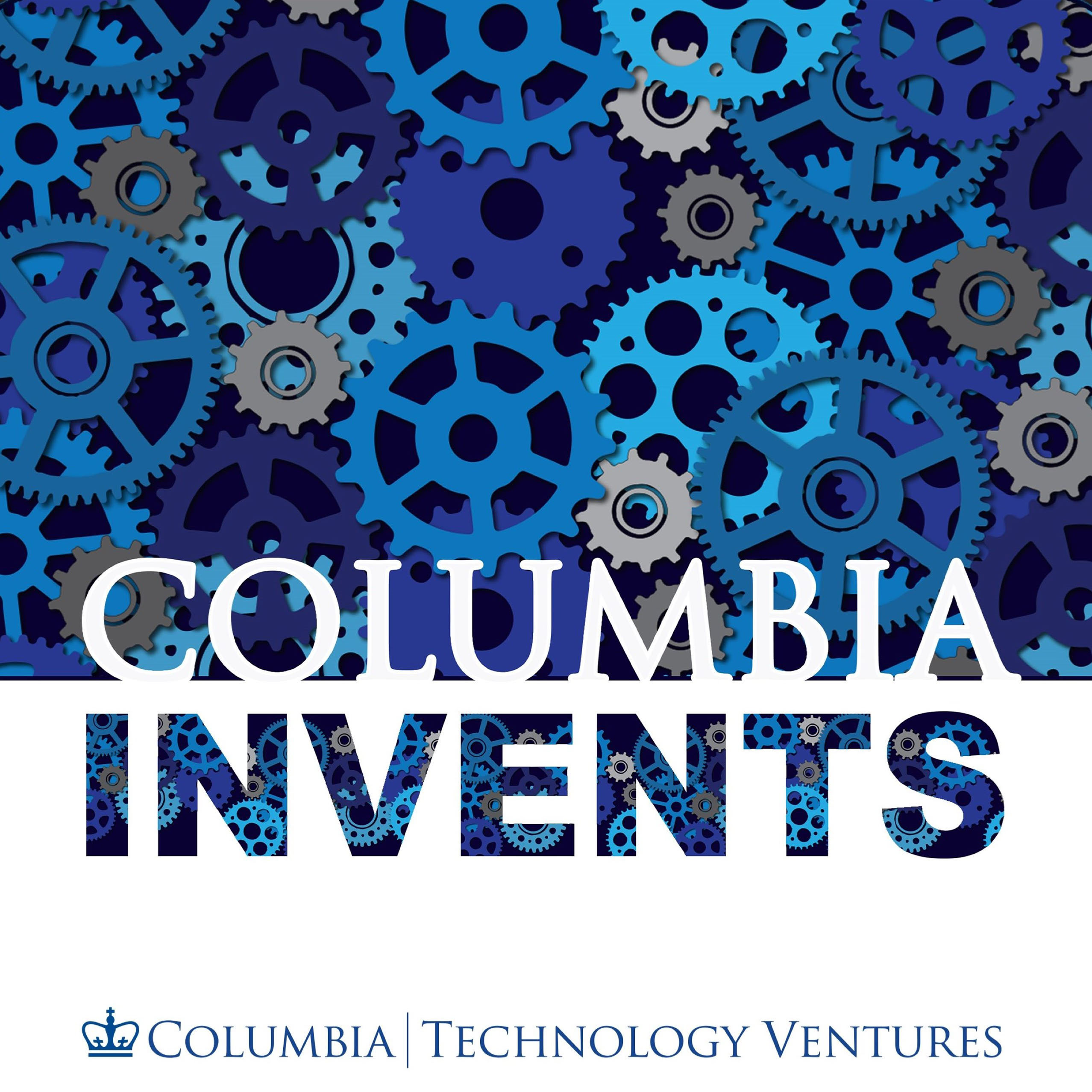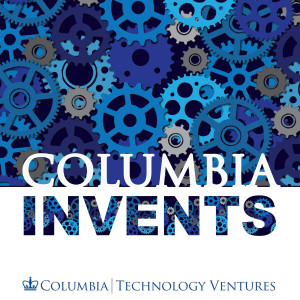
5.8K
Downloads
25
Episodes
The Columbia Invents podcast by Columbia Technology Ventures is a series of interviews with faculty researchers at Columbia University. Hosted by Orin Herskowitz, Executive Director of Columbia Technology Ventures, the series explores breakthrough innovations being developed in Columbia’s scientific laboratories, the process of spinning these technologies out of the lab and into the market via industry or startups, and the challenges early stage technologies must overcome in order to realize their full potential.
The Columbia Invents podcast by Columbia Technology Ventures is a series of interviews with faculty researchers at Columbia University. Hosted by Orin Herskowitz, Executive Director of Columbia Technology Ventures, the series explores breakthrough innovations being developed in Columbia’s scientific laboratories, the process of spinning these technologies out of the lab and into the market via industry or startups, and the challenges early stage technologies must overcome in order to realize their full potential.
Episodes

Thursday Dec 05, 2024
Marc Singer and Bill Harrington
Thursday Dec 05, 2024
Thursday Dec 05, 2024
Today’s guests are Marc Singer and Bill Harrington, co-Managing Partners at OUP, a venture fund that solely invests in startups emerging from university research labs. With over $800M under management and over 130 investments in university startups since 2011, Marc and Bill share their unique insights into the opportunities and challenges in bringing university innovations to the market; why fundraising strategy matters; what they look for when considering an investment (hint: teams matter); when is the right time to spin your startup out of the university; and the most frequent self-inflicted wounds they see from university entrepreneurs. Bill and Marc also share their own VC origin stories, why they have stayed in venture for so long, and advice for people looking to break into the industry.

Thursday Sep 28, 2023
Gad Berdugo
Thursday Sep 28, 2023
Thursday Sep 28, 2023
Gad Berdugo, CTV Executive-in-Residence and former Chief Business Officer of Editas, talks with CTV’s Ofra Weinberger about why he is so excited about the potential for precision medicine, gene editing, and advanced diagnostics for improving human health; about the waves of new therapeutics that may come in the years ahead for thousands of genetic diseases; and about the business model opportunities and challenges behind these new innovations.

Friday Sep 08, 2023
Meera Garcia
Friday Sep 08, 2023
Friday Sep 08, 2023
Dr. Meera Garcia, CEO of new startup Lantern Laboratory and former Chief Medical Officer of Advantia Health, talks to us about the limitations of what anesthesiologists can know today about our brains while in surgery; how her new startup (based on innovations emerging from the lab of Dr. Paul Garcia, who is also Meera’s husband) provides far more information for anesthesiologists; how, despite her impressive background in human health, she had to learn the skills behind launching her startup company; and what it has been like being a female CEO in a male-dominated startup world.

Thursday Jun 01, 2023
Ngai Yin Yip
Thursday Jun 01, 2023
Thursday Jun 01, 2023
Dr. Ngai Yin Yip is the Lavon Duddleson Krumb Assistant Professor of Earth and Environmental Engineering at Columbia and co-founder of Trident Desalination, a startup commercializing temperature swing solvent extraction (TSSE) desalination. In a conversation with Dr. Dovina Qu, his licensing officer at Columbia Technology Ventures, Dr. Yip discusses his lab’s research into new ways to remove salt from hypersaline solutions to make that water usable again, as well as ways to recover precious resources from waste streams. He explains why traditional methods of making usable water, typically via condensation, are so energy intensive, and why his approaches are much cheaper, less resource hungry, and more flexible. He shares why this is critically important to lower the environmental impact in industrial production and mining, as well as to help ensure clean water supplies in places like Arizona and Nevada that aren’t near the ocean.

Monday May 15, 2023
Dan Esposito
Monday May 15, 2023
Monday May 15, 2023
Dr. Dan Esposito is an Associate Professor of Chemical Engineering at Columbia and co-founder of sHYp, a startup that uses seawater to produce hydrogen without damaging the environment. Dr. Esposito explains solar fuels, the energy sources his lab studies that are created using the unlimited energy of the sun and can store much more energy than batteries can, but without the climate harm done by petrochemicals. In particular, he’ll talk about why hydrogen is such a promising replacement for fossil fuels for specific applications, such as fuel cells for vehicles or as a precursor material for industrial manufacturing. He’ll also share what he learned on his one-year sabbatical at sHYp, the resources at Columbia he used to get the company going, and the advice he gives his students about how to build successful careers as scientists and entrepreneurs.

Tuesday Mar 14, 2023
Azra Raza
Tuesday Mar 14, 2023
Tuesday Mar 14, 2023
Dr. Azra Raza is the Chan Soon-Shiong Professor of Medicine and Director of the Myelodysplastic Syndrome at Columbia University Irving Medical Center, a clinician, and a researcher specializing in Myelodisplastic Syndrome (MDS) and acute myeloid leukemia (AML), two devastating blood cancers. She discusses what we know about why patients get MDS and AML; why we know so little about so many forms of cancer despite many decades of research; and how her new startup is part of her effort to find the so-called first cell, which would allow us to catch and potentially treat cancer at a much earlier stage. She also shares what led her to a career in medicine and what advice she would give to students interested in following a similar path.

Monday Feb 13, 2023
Alexander Gaeta
Monday Feb 13, 2023
Monday Feb 13, 2023
Dr. Alexander Gaeta is the David M. Rickey Professor of Applied Physics and Materials Science and a Professor of Electrical Engineering at Columbia University. He’s also the founding CEO of Xscape Photonics, a startup commercializing his photonics-based chip that will make large-scale computing systems more efficient. He talks about why he gave up his shot at being a professional tennis player to pursue a career in physics; how not getting into his dream college led him to optical engineering; the lessons he learned from his prior startup; and the resources at Columbia he took advantage of while building Xscape, which recently raised $10M.

Friday Nov 11, 2022
Charles Zuker
Friday Nov 11, 2022
Friday Nov 11, 2022
Dr. Charles Zuker is a Professor of Biochemistry and Molecular Biophysics and of Neuroscience at Columbia University and a Principal Investigator at Columbia's Zuckerman Institute. Dr. Zuker explains why our sense of taste is so evolutionarily critical to our survival; how taste was fundamentally misunderstood until about 20 years ago; how our stomachs tell our brains to go for real sugar instead of artificial sweeteners; why the Zuckerman Institute and the Jerome L. Greene Science Center is such a fabulous place to study neuroscience; and why the Institute has artists-in-residence working alongside the scientists. Also, the video of controlling thirst in mice using light that is referenced in the podcast can be found here: https://www.youtube.com/watch?v=_z51OGBaWko
Note: the Zuckerman Institute’s air filtration system is top notch, but caused a hum in the background that we couldn’t edit out.

Friday Sep 16, 2022
Wendy Chung
Friday Sep 16, 2022
Friday Sep 16, 2022
Dr. Wendy Chung is the Kennedy Family Professor of Pediatrics in Medicine at Columbia University Irving Medical Center and a leader in genomic and precision medicine. She discusses what it means to be a “zebra hunter” in medicine and how it’s led her to discover dozens of rare genetic diseases, the impact that earlier diagnosis and gene therapy have had on devastating childhood diseases such as spinal muscular atrophy, and the role genes play in obesity, autism, autonomic disorders, and more.

Friday Sep 09, 2022
Rudy Leibel
Friday Sep 09, 2022
Friday Sep 09, 2022
Dr. Rudy Leibel is the Christopher J. Murphy Memorial Professor of Diabetes Research, Professor of Pediatrics and Medicine at Columbia University Irving Medical Center, and an expert in the genetics of obesity. He explains why humans have adipose tissue, how fat engages in dialog with the brain, and the role genes play in how hungry a person feels and in the ability to resist the temptation of junk food. He also tells the story of how a patient encounter sent him down a path towards discovering and cloning leptin, an adipose-derived hormone responsible for regulating body weight.
